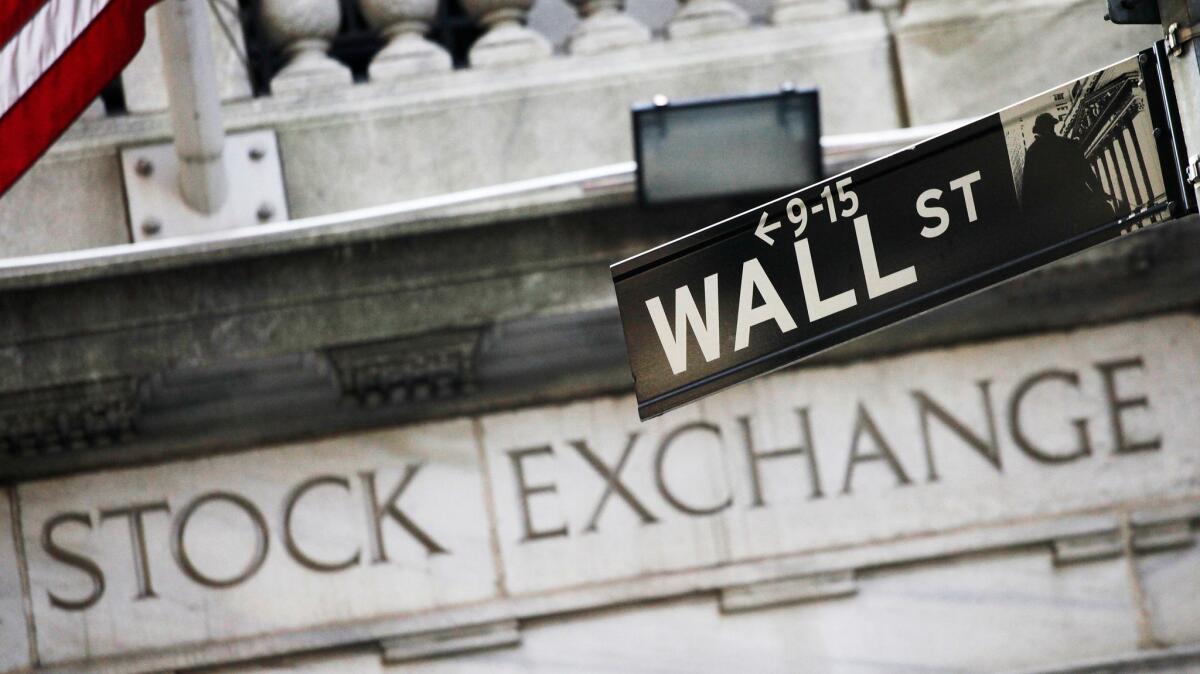Stocks edge down as presidential election brings uncertainty

Stocks were mostly unchanged Monday, despite some positive economic data and a raft of big merger announcements over the weekend.
Hesitant traders continued to watch the day-to-day developments of the U.S. presidential election, which is next week.
The Dow Jones industrial average fell 18.77 points, or 0.1%, to 18,142.42. The Standard & Poorâs 500 index slipped 0.26 point, or less than 0.1%, to 2,126.15 and the Nasdaq composite fell 0.97 point, or less than 0.1%, to 5,189.13.
With Mondayâs close, the major indexes ended October broadly lower. The Dow fell 0.9% during the month, the S&P 500 fell 1.94% and the Nasdaq fell 2.3%. It was the third straight month of declines.
The news out late last week regarding newly found emails that may be related to Hillary Clintonâs email practices threw the electionâs results into more uncertainty, which investors typically donât like. Over the weekend, the FBI obtained a warrant to begin reviewing those emails.
âThe reopening of the email investigation into Hillary Clinton certainly throws a wrench into the presidential election now just eight days away,â John Briggs, head of fixed income strategy for the Americas at RBS, said in a note to investors.
Investors also have two heavyweight events on the economic front this week: a meeting of the Federal Reserve and the October jobs report. The Fedâs policymakers are widely expected not to raise interest rates so close to the election and, rather, to wait until the December meeting to raise rates. However, any economic observations from the bank will be important to investors. The jobs report will be the last major piece of economic data out before the Nov. 8 election.
Read more: Consumer spending rebounds with its biggest jump since June »
Itâs also a busy week for corporate earnings, with more than one-fifth of S&P 500 companies reporting their quarterly results.
Wall Street got another wave of mega-deals over the weekend. General Electric announced it would merge its oil and gas division with Baker Hughes, creating a new company with $32 billion in annual revenue. GE shares fell 0.4% to $29.10 while Baker Hughes sank 6.3% to $55.40.
Telecommunications company CenturyLink announced it is buying competitor Level 3 Communications for $24 billion. CenturyLink shares dived 12.5% to $26.58 and Level 3 rose 3.9% to $56.15. Earlier in the month AT&T announced it would buy Time Warner for $80 billion.
The wave of mergers was not limited to the U.S. Also on Monday, three of Japanâs largest shipping companies announced they would merge their shipping-container operations.
U.S. government bond prices rose slightly. The yield on the 10-year Treasury note fell to 1.83% from Fridayâs 1.85%. The dollar rose against the euro, British pound and Japanese yen.
U.S. benchmark oil futures extended their losses after falling last week to their lowest price of the month. Crude fell $1.84 to $46.86 a barrel. Brent crude, the international standard, fell $1.41 to $48.30 a barrel.
Wholesale gasoline fell 2 cents to $1.45 a gallon. Heating oil fell 5 cents to $1.496 a gallon. Natural gas fell 8 cents to $3.026 per 1,000 cubic feet.
Gold fell $3.70 to $1,273.10 an ounce, silver was flat at $17.80 an ounce and copper edged up 1 cent to $2.21 a pound.
ALSO
Elon Musk wants to sell you a better-looking solar roof
Fisker will challenge Tesla with its own high-end electric car
Clintonâs immigration plan could help economy more than Trumpâs, most economists say
UPDATES:
2:50 p.m.: This article was updated with closing prices, analysis and additional market information.
8:25 a.m.: This article was updated with more recent prices and additional market information.
This article was originally published at 7:05 a.m.
More to Read
Inside the business of entertainment
The Wide Shot brings you news, analysis and insights on everything from streaming wars to production â and what it all means for the future.
You may occasionally receive promotional content from the Los Angeles Times.










